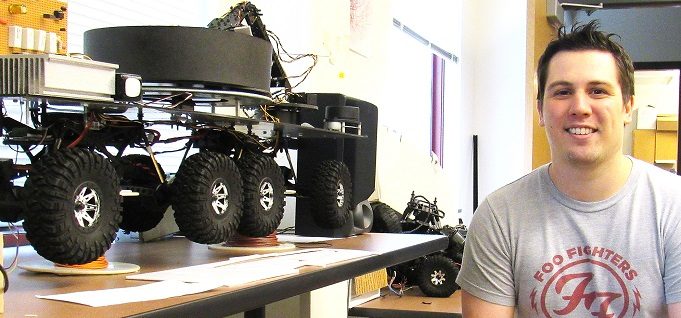Prepped for opportunities in the smallest of worlds
By Bill Foley
May 17, 2017
A nanofabrication technology capstone semester at Penn State University provides students a chance to explore careers in nanotechnology.
Butler County Community College (BC3) sophomore Ross Black has his sights set on that which the naked eye can’t see, matter 100,000 times thinner than the width of a human hair.
Then and only then will he be able to learn to manipulate atoms and molecules in preparation for a career in nanotechnology – be it in the health, energy, medicine, agricultural or technology sectors.
Black is among four BC3 students accepted this spring to the 17-year-old Pennsylvania Nanofabrication Manufacturing Technology Partnership’s capstone semester at Penn State’s University Park campus. Students who are accepted to the 18-credit program and earn at least a “C” grade in its six courses receive a certificate from Penn State’s College of Engineering.
In addition, for students also enrolled in BC3’s nanofabrication technology program, the 18-credit program at Penn State must be completed in order to earn their associate degree.
That four BC3 students — the highest number for the college — have been accepted to the capstone semester speaks highly of BC3 and its science and technology students, says Matt Kovac, dean of BC3’s science, technology, engineering and mathematics division.
“Penn State, by and large, has had very good experiences with our students,” Kovac says. “We have credibility with them. Our students are well-prepared. They go there and succeed.”
Starting salaries
The capstone semester will run May 15 to August 4, according to Susan Barger, operations manager of Penn State’s Center for Nanotechnology Education and Utilization. Students will learn about giving antibacterial properties to cell phones, creating more efficient solar panels, making sunscreen and cosmetics more effective, ensuring that food stays fresher longer, and making smaller and faster electronic devices, according to Penn State. Entry-level salaries in nanotechnology can reach $55,000.
“I hope to develop skills in working with things on the nano level so I can get a job working in the field,” says Black, 26, who is majoring in both robotics technology and nanofabrication technology at BC3.
The Nanofabrication Manufacturing Technology Partnership is a joint effort between Penn State and 26 of the state’s colleges and universities. Its mission is to educate students in nanotechnology-based manufacturing and new-product development for a field that needed 1 million microelectronic fabrication technologists, research assistants, materials research technicians and semiconductor fabrication technicians as of 2015, according to a National Science Foundation estimate.
“To meet worldwide competition, the U.S. must ensure that this need for a nanotechnology work force is effectively met with high quality education,” according to Barger.
Grad credits prep
Ben Wilson is among the 23 BC3 science and technology students who have received that high-quality education at BC3 and through the capstone semester. The 32-year-old, a 2006 BC3 graduate with an associate of applied science degree in metrology with precision measurement technology, is a manufacturing supervisor at a Reading company that makes fiber optic components for computers and cellphones.
“The Penn State program was basically the equivalent of getting an entire second associate degree,” Wilson said.
His BC3 physics and chemistry courses were important because students in the capstone semester need a solid understanding of those fields to be able to comprehend nanotechnology, Wilson said.
“If you don’t have that understanding, then you are going to be completely lost when you get to the nano program,” Wilson said, adding that vacuum technology, covered in his BC3 physics course, “is major when you get into nanotechnology.”
If he were to have looked for a job in nanotechnology without attending the capstone semester, “I would have been completely lost,” Wilson said. “With no understanding of it whatsoever. But having that program, it allowed me to go to a job in that field, not only where I had the potential to make more money, but I had a better understanding of the nanotechnology that we were doing at work than most of the people who had been working there for years.”
There’s more to the story. Read the full article in CC Daily.


